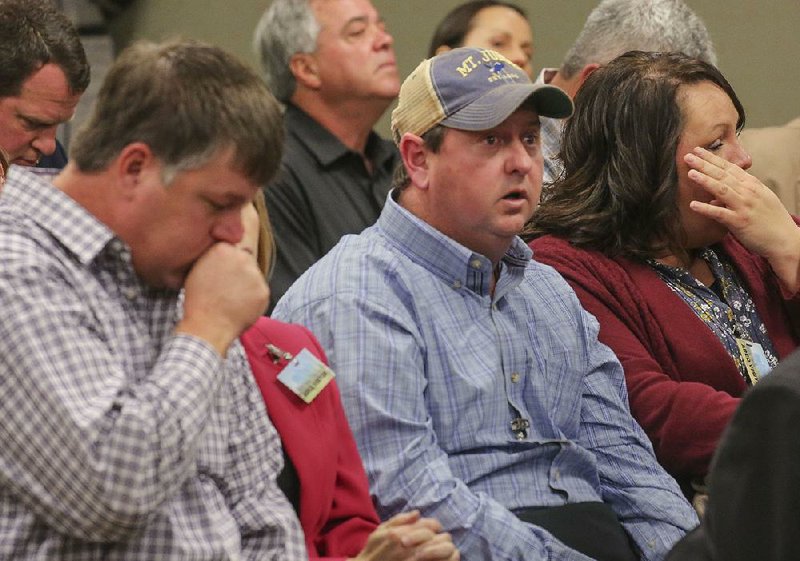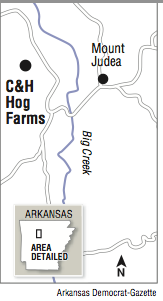The Arkansas Pollution Control and Ecology Commission issued on Wednesday a stay of the Arkansas Department of Environmental Quality's decision to deny C&H Hog Farms' application to continue operating in the Buffalo National River's watershed.
Operators of the farm with its 6,503 pigs on Big Creek must appeal the department's decision by Feb. 10 to maintain the stay. If the farmers do so, the stay would continue until the appeal process concludes.
Attorneys for the farmers argued Wednesday at a hearing that the stay should be granted on the grounds that failure to grant it would close the farm and cause irreparable harm to the farmers' livelihoods.
Opponents of the farm argued that the stay could not be legally granted when the permit is not under review.
The department did not take a position at the hearing.
C&H Hog Farms operates on the Buffalo River's fifth-largest tributary -- Big Creek -- 6 miles from where it enters the Buffalo River. Concerns for the river, which attracted nearly 1.8 million visitors in 2016, have galvanized opposition to the farm.Its detractors fear that pig manure stored in pits or spread on land will pollute the scenic, free-flowing river popular with floaters, fishermen, hikers and campers.
"We feel that we've been treated unfairly, and we hope this will give us an opportunity to bring that to light," said Jason Henson, a co-owner of C&H Hog Farms.
Henson owns the farm with his cousins Richard Campbell and Phillip Campbell on family land near Mount Judea in Newton County.
Opponents of the hog farm said they were not surprised by the commission's decision but were nonetheless frustrated.
"I'm disappointed on behalf of the Buffalo River," said Brian Thompson, a board member on the Buffalo River Watershed Alliance, which had filed a motion to deny the farm's request for a stay. The alliance formed in 2013 to oppose the hog farm.
The Pollution Control and Ecology Commission is the Arkansas Department of Environmental Quality's appellate body. The department approves and denies permits and permit modifications, and its decisions can be appealed to the commission.
C&H Hog Farms' original permit was never appealed to the commission because no one who opposed it submitted any public comments. Appeals must be based on issues raised in public comments that a commenter believes were not adequately addressed in the final permit decision.
Many opponents of C&H have said they did not comment on the original permit because they did not know about it, noting that notice of the permit application was only required to be posted on the department's website rather than in a newspaper, as is required of other permits.
If the commission had not approved a stay Wednesday, the department would have asked C&H to submit plans to close and clean up its operations.
During the nearly two-hour hearing on the motion Wednesday, attorneys and commissioners debated whether the farm could request the stay at all, given that its attorneys had not filed an appeal of the department's decision.
Department regulations stipulate that the commission may not issue a stay on a permit denial while the permit is under review unless under "appropriate circumstances to avoid substantial prejudice to any party."
"At this point there is no review," Buffalo River Watershed Alliance attorney Richard Mays said.
"It's not appropriate. It's not timely to decide whether to stay a decision that's not even before you," Mays continued.
C&H attorney Bill Waddell said he had not yet filed an appeal because it was unclear to him and his clients why the department had rejected the application.
The department stated in its permit denial that it did not have sufficient information to ensure compliance with Regulation 5.402, which sets out the design and waste management systems as described in a technical guide and a federal handbook that is published by the U.S. Department of Agriculture Natural Resource Conservation Service.
But Waddell stated repeatedly that he and his clients had reached out to the department to ensure it had all the information it needed.
The commission's administrative law judge, Charles Moulton, cut off Waddell, stating that the question at hand Wednesday was whether a stay should be approved, not whether the denial was appropriate.
Mays also argued that C&H's attorneys had provided no documentation explaining the damage they would face if they were forced to shut down.
If shut down, Waddell said, C&H would lose its pigs via breach of contract with hog supplier JBS Live Pork and would have to buy them back if they were able to restart in the future.
"It would be another eight to nine months from today before they could get back into an income producing or income stream," Waddell said.
The commission heard 10 public comments Wednesday, including five from C&H supporters who expressed concern that not getting a stay would force the owners of C&H to lose their livelihoods.
"We're going to lose everything if you don't grant me this stay. That's the way it is," Henson said. "JBS will pull their hogs out immediately, there's no ifs ands or buts about this. This is our livelihood that you're fiddling with here."
Jerry Masters, executive vice president of Arkansas Pork Producers Association, and others noted that the department and the U.S. Environmental Protection Agency had not found any environmental violations.
"These folks are the gold standard of what we need from pork producers in Arkansas," Masters said.
Other supporters argued that data collection done by University of Arkansas, Fayetteville researchers and a drilling project conducted in 2016 found no causes for concern.
But opponents of C&H cited different data in arguing the opposite. U.S. Geological Survey data show a lack of dissolved oxygen in recent years in Big Creek downstream of C&H, they said. Low dissolved oxygen can harm aquatic life and be a precursor to algae.
Opponents said said they fear an incremental degradation of Big Creek and the Buffalo National River if the farm continues to operate.
Thompson of the watershed alliance argued that the farm never should have been built in the first place, according to the technical guide and field handbook, which recommend finding a waste management system other than C&H's holding ponds if porous karst terrain is found 5 feet below the bottom of a holding pond. In the case of C&H, karst was detected in the drilling study to be above that level, Thompson said.
"In other words, it's saying that this thing shouldn't have even been built there," Thompson told the commission. C&H poses a continued risk, he said.
Moulton told commissioners that he thought they had three options on C&H's request. They could deny the stay by citing a lack of jurisdiction because no appeal had been filed; they could approve the stay to last only the duration of the period in which C&H can appeal; or they could initiate their own review of the permit in the absence of an appeal, triggering the public notice of the review to the more than 10,000 permit commenters.
He called the dilemma the "quintessential unorthodox situation." He said he wasn't aware of any legal precedent for the situation.
Commissioner Joe Fox, the state forester, motioned to approve a stay during C&H's window to appeal, with several seconds.
Commissioner Gary Wheeler, who represents the Arkansas Department of Health, said he was concerned about the commission's authority to issue the stay and that he was unsure of the harm C&H faced by not being granted the stay and what the conditions of the farmers' contract with JBS are.
"I am concerned that we would be making this decision without really having the authority of the statute," he said.
After many questions about the proposed stay, the commission's regulations and the impact of voting either way, the commission handily approved the stay.
Wheeler abstained from the vote, and Commissioner Robert Reynolds recused because of a conflict of interest over the type of permit C&H sought. The other commissioners, who were all present either in person or via telephone, voted in favor.
Metro on 01/18/2018

